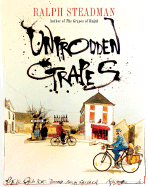Today's
Rocky Mountain News
highlights another battleground in the textbook market: an off-campus
bookseller (in this case a future one) that objects to paying for text
lists that the state says must be made public.
A Beat the Bookstore franchisee, who plans to open a 3,000-sq.-ft. text
store in Boulder, does not want to pay an estimated $3,000-$3,500 per
semester for the University of Colorado's textbook list. An off-campus
B&N pays the fee, and Colorado Bookstore says it pays even more
than what Beat the Bookstore would pay. Because the list is not
electronic, the university says, it's more expensive to duplicate than
at some other schools.
---
Baker & Taylor is buying the inventory of defunct Koen Book
Distributors--more than 60,000 books--for $4.5 million, which will go
to repay the $3.5 million Koen owes PNC Bank,
PW Daily reported. The rest will go to unsecured creditors, mainly publishers, who are owed several times the amount owed PNC.
---
What nobody is calling the energy crisis is expected to help online
retailers--according to several surveys and predictions quoted by the
"E-Commerce Report" in Monday's
New York Times. Some 40% of
Internet shoppers have increased Web purchases to save gas on trips to
the store, a Shopzilla survey found. And eMarketer predicted that
online sales in the last quarter of the year will rise 22% to $26
billion. By contrast, store sales during the holidays may rise 5%.
Donna L. Hoffman, a marketing professor at Vanderbilt, told the
Times
that high gas prices "won't necessarily bring in more people to shop
online, but [they] will bring in people more often." Some sites are
doing away with shipping fees to help make the online marketplace more
attractive to consumers. But, Hoffman said, even a $5 charge for
shipping can seem reasonable for people who don't want to pay for gas
and place a high value on their time.
---
Most of a piece in yesterday's
Christian Science Monitor
on the used book market covers familiar Book Industry Study Group ground (
Shelf Awareness, September 29). But the
Monitor story included an interesting way of framing the used book dynamic.
Dan Nissanoff, whose book,
Futureshop: How the New Auction Culture Will Revolutionize How We Buy, Sell, and Get Things We Really Want,
will be published by Penguin Press January 19 (and be available "used" minutes thereafter), told the paper that an "auction
culture," which "promotes temporary ownership as an efficient way to
live a better life," underlies the public's growing acceptance of
buying used books.
"We've historically been a society that accumulates, that views
acquisition as permanent," he continued. "Now channels such as
Amazon.com, eBay, and Barnes & Noble have made it easy for us not
only to buy books but sell our books as well. They're accelerating the
auction culture and pushing this behavior to the mainstream. It's
beginning to have a big impact on the book industry."









